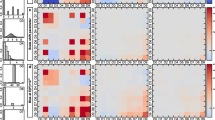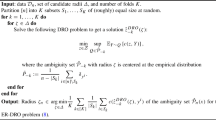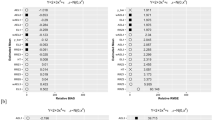Abstract
For a recursive maximum-likelihood estimator with step lengths decaying as 1/n, an adaptive matrix needs to be incorporated to obtain asymptotic efficiency. Ideally, this matrix should be chosen as the inverse Fisher information matrix, which is usually very difficult to compute for incomplete data models. In this paper we give conditions under which the observed information can be incorporated into the recursive procedure to yield an efficient estimator, and we also investigate the finite sample properties of these estimators by simulation.
Similar content being viewed by others
References
Behboodian J (1972) Information matrix for a mixture of two normal distributions. J. Statist. Comput. Simul. 1:295–314
Csörgö M, Fischler R (1973) Some examples and results in the theory of mixing and random-sum central limit theorems. Period. Math. Hungar. 3:41–57
Dattatreya GR, Kanal LN (1990) Estimation of mixing probabilities in multiclass finite mixtures. IEEE Trans. Syst. Man Cybern. 20:149–158
Dattatreya GR, Kanal LN (1991) Asymptotically efficient estimation of prior probabilities in multiclass finite mixtures. IEEE Trans. Inform. Theory 37:482–489
Dempster AP, Laird NM, Rubin DB (1977) Maximum likelihood from incomplete data via the EM algorithm. J. Royal Statist. Soc. 39:1–22
Dubins LE, Freedman DA (1965) A sharper form of the Borel-Cantelli lemma and the strong law. Ann. Math. Statist. 36:800–807
Fabian V (1978) On asymptotically efficient recursive estimation. Ann. Statist. 6:854–866
Fabian V (1988) The local asymptotic minimax adaptive property of a recursive estimate. Stat. Prob. Letters 6:383–388
Hall P, Heyde CC (1980) Martingale limit theory and its applications. Academic Press, New York
Hall P, Patil P (1994) On the efficiency of on-line density estimators. IEEE Trans. Inform. Theory 40:1504–1512
Holst U (1987) Recursive estimation of quantiles using recursive kernel density estimators. Seq. Anal. 6:219–237
Holst U, Lindgren G (1991) Recursive estimation in mixture models with Markov regime. IEEE Trans. Inform. Theory 37:1683–1690
Kazakos D (1977) Recursive estimation of prior probabilities using a mixture. IEEE Trans. Inform. Theory 23:203–211
Kushner HJ, Clark DS (1978) Stochastic approximation methods for constrained and unconstrained systems. Springer-Verlag, New York
Ljung L (1978) Strong convergence of a stochastic approximation algorithm. Ann. Statist. 6:680–696
Ljung L, Söderström T (1983) Theory and practice of recursive identification. MIT Press, Cambridge
Major P, Révész P (1973) A limit theorem for the Robbins-Monro approximation. Z. Wahrsch. verw. Geb. 27:79–87
Polyak BT, Juditsky AB (1992) Acceleration of stochastic approximation by averaging. SIAM J. Control Optim. 30:838–855
Ruppert D (1982) Almost sure approximations to the Robbins-Monro and Kiefer-Wolfowitz processes with dependent noise. Ann. Prob. 10:178–187
Ruppert D (1991) Stochastic approximation. In: Ghosh BK, Sen PK (ed) Handbook of sequential analysis, Marcel Dekker, New York.
Schwabe R (1986) Strong representation of an adaptive stochastic approximation procedure. Stoch. Proc. Appl. 23:115–130
Stout WF (1974) Almost sure convergence. Academic Press, New York
Titterington DM (1984) Recursive parameter estimation using incomplete data. J. Royal Statist. Soc. B 46:257–267
Weinstein E, Feder M, Oppenheim AV (1990) Sequential algorithms for parameter estimation based on the Kullback-Leibler information measure. IEEE Trans. Acoust. Speech Signal Process. 38:1652–1654
Author information
Authors and Affiliations
Additional information
Supported by the Swedish Natural Science Research Council (contract no. F-PD 10538-301), the Fulbright Commission, and Kungliga Fysiografiska Sällskapet i Lund.
Rights and permissions
About this article
Cite this article
Rydén, T. Asymptotically efficient recursive estimation for incomplete data models using the observed information. Metrika 47, 119–145 (1998). https://doi.org/10.1007/BF02742868
Received:
Issue Date:
DOI: https://doi.org/10.1007/BF02742868




